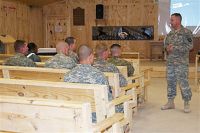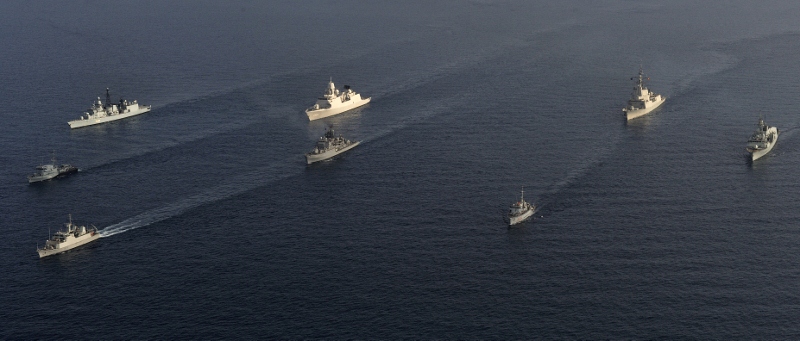WASHINGTON, April 11, 2011 — Efforts to take the stigma out of seeking help when it’s needed and build resiliency within the force appear to be paying off, the commander of a brigade that’s seen heavy action in Afghanistan told American Forces Press Service.
Army Col. Sean M. Jenkins, commander of the 101st Airborne Division’s 4th Brigade Combat Team, reported promising signs that soldiers are heeding the message being sent from Defense Secretary Robert M. Gates on down that seeking mental, physical or spiritual care is a sign of strength, not weakness.
“We are making progress in moving to a point where there is not a stigma, and there shouldn’t be,” Jenkins said. “Every unit is different, and every squad and team is different. But I think we’ve come to a point where the stigma is diminishing and where soldiers recognize that it’s sometimes okay to raise their hand and say, ‘Hey, I can’t go on this [mission].’ ”
Jenkins’ brigade, the last to deploy to Afghanistan as part of the 30,000-troop surge there, has taken heavy casualties since arriving last summer in the remote Paktika province that borders Pakistan. Fifteen “Currahee Brigade” soldiers have been killed, with scores more wounded and more than 40 soldiers flown out of the theater for advanced medical care. In addition, two soldiers attempted suicide, and Jenkins said he’s been surprised at how many have met with the brigade chaplain, psychologist or physical therapist for emotional, spiritual, mental health or physical help.
“I am glad the help is there, and I certainly want every Currahee to say it is accessible, and to say, ‘I don’t think I will be looked at differently if I seek it,’ ” Jenkins said. “That is the hurdle, but I think we have gotten better at that.”
The brigade began building resiliency skills long before arriving in Afghanistan, he said. The unit’s pre-deployment training included a “Toccoa Tough” program — named for the Georgia town where the storied unit that came to be known during World War II as the “Band of Brothers” was founded in 1942. The program emphasizes mental as well as physical resilience for soldiers and their families.
That training continues in the combat theater, where the brigade holds a three-day, semi-monthly course that reinforces the principles of mental, physical and spiritual health, and sessions covering everything from physical health and nutrition to proper sleep methods and how to deal with stress. Attendees are encouraged to take what they learn and apply it, not only to themselves, but also to their peers and subordinates.
“It’s a constant process,” Jensen said of resiliency-building efforts that will continue throughout the deployment and after redeployment to Fort Campbell, Ky. Resiliency focuses heavily on junior leaders taking care of their soldiers and soldiers looking out for each other, he said. “It’s a team effort,” he said. “But it is really interaction with leaders — junior leaders, team leaders, squad leaders. There is so much on their shoulders.”
Jenkins called junior leaders and noncommissioned officers his front line of defense in recognizing soldiers in need of help. That, he said, requires knowing each soldier — his or her family situation, likes, dislikes and challenges. “That is what you have to know, because then you can pick up when they are not acting right or something is bothering them. The challenge is to know your people,” he said. “And that is all part of leadership: How do you help them through that situation?”
Jenkins and his commanders have seen the negative effects of news coverage — a suicide bomber who kills innocent civilians, a Quran burning in Florida, inflammatory photographs of soldiers doing the wrong thing — on their troops. “Those [news stories] impact every soldier,” he said. The death of a unit member, or even enemy contact when everyone survives intact, also can trigger issues. So after every “event,” Jenkins requires his soldiers to pause and evaluate what happened and how they feel about it.
“This is about sitting down and talking with them,” he said. “It’s talking with them as a unit, then as a smaller unit, then as individuals.” When a unit loses a soldier, Jenkins sends in his mental- and spiritual-health team to provide immediate support and, as part of the memorial process, temporarily pulls that unit from combat operations.
“We pull the unit off the line and let them know, ‘You don’t have to go out until you are ready to go out,’ ” he said. “Everybody deals with it differently, but we are empowering those junior leaders to help their soldiers deal with these stresses.”
Soldiers rarely raise their hand and ask not to go out on a mission. So Jenkins encourages his junior leaders to take the first step, approaching an individual soldier when they think it appropriate and suggesting, “Why don’t you sit this one out?”
“It’s not derogatory,” he said. “It is empowering your leaders and identifying, “How can we do this better?” And I think the Army has done a phenomenal job in making this happen.” Jenkins sees the flow of Red Cross messages that arrive in the theater, and knows the span of issues that impact his 4,200 soldiers. As a result, he also empowers his commanders to identify when a soldier needs to go home to deal with a problem there.
“A lot of things happen back home that will distract people forward. And you don’t want your people distracted,” he said. “You want them focused. So if a commander comes forward and says, ‘Sir, I need to send so-and-so home,’ I say, ‘Roger that.’ ”
The approach appears to be working as the brigade approaches the final months of what Jenkins called an “incredibly successful deployment.”
“This is a unit that had just five months notice to deploy, that was not on any patch chart, and where roughly 60 percent deployed to Afghanistan the last time just 17 months prior,” Jenkins said.
“But they are doing a phenomenal job, and it all falls back on the leaders,” he said. “They make some incredible decisions in trying to do and accomplish the right thing. They just do it, day-in and day-out, and they do it well. It’s just remarkable.”
Source:
U.S. Department of Defense
Office of the Assistant Secretary of Defense (Public Affairs)

 von
von 

